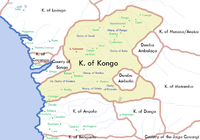Congo (area)

Congo is a region in Central Africa inhabited by the Kongo people, in addition to some other ethnic groups. The region is considered the historical living space of the various Congolese people(s).
Historically[edit]
This section needs expansion with: further demographic and geographical details. You can help by adding to it. (July 2014) |
Congolian forests[edit]
Historically, the region of the Congo was a vast geographical area of equatorial Africa located in the tropical wet forest of Central Africa called Congolian forests.
Kingdom of Kongo[edit]

It also owes its name to the predominant ethnic group in the region, ruled by Kingdom of Kongo founded towards the end of the 14th century and extended from 1390 to 1914.
Although the span of rule of the kingdom varied, in its greatest extent, the Kingdom of Kongo reached from the Atlantic Ocean in the west to the Kwango River in the east, and from the Congo River in the north to the Kwanza River in the south. The kingdom largely existed from c. 1390 to 1891 as an independent state, and from 1891 to 1914 as a vassal state of the Kingdom of Portugal.
Congo Basin and the Congo River[edit]

The Congo River, the main river in the area, flows through the region forming the Congo Basin.
Languages[edit]
This section needs expansion with: languages indigenous to the region and its peoples. You can help by adding to it. (July 2014) |
Majority of the people of Congo spoke the Kikongo (the Kongo language), but other prominent languages spoken by significant portions of Congolese populations included Lingala, Tshiluba and Kiswahili.
European languages are also vastly spoken by the Congolese populations as lingua francas, most notably French owing to long-running colonial rule of the various areas of Congo by the French and Belgians. Some Congolese populations also speak Portuguese particularly in the Cabinda Province, earlier known as Portuguese Congo and presently an exclave of Angola.
Present-day Congolese countries and regions[edit]

The nowadays geographic region spans across:
Republic of the Congo[edit]

Comprising former French Congo under French colony that continued from 1880 to 1960.
The French Congo was sometimes known as Gabon-Congo.[1] formally adding French Gabon in 1901 to the territory which was officially renamed Middle Congo (French: Moyen-Congo) in 1903. Temporarily divorced from Gabon in 1906, it was then reunited as French Equatorial Africa in 1910 in an attempt to emulate the relative success of French West Africa with territories of Chad, Oubangui-Chari (currently Central African Republic), French Congo, Gabon and French Cameroon.
With independence, the country was declared as People's Republic of the Congo from 1970 to 1991, and since then as Republic of the Congo. It is also commonly known as Congo-Brazzaville or just Congo.
Democratic Republic of the Congo[edit]

Comprising former Belgian Congo under Belgian colony.
Historically known as Congo Free State from 1885 to 1908, it became what is known as Belgian Congo from 1908 to 1960. In 1960 independence was declared with the country becoming known as Republic of the Congo (Léopoldville) or Congo-Léopoldville from 1960 to 1964.
Under the rule of Mobutu Sese Seko, the country was known as Zaire from 1965 to 1997, when name was officially changed to Democratic Republic of the Congo (DRC)
It is also commonly known as Congo-Kinshasa.
The Angolan exclave of Cabinda[edit]

Comprising formerly Portuguese Congo under Portuguese colony.
It was known locally as Tchiowa and is an exclave and province of Angola. Modern Cabinda is the result of a fusion of three kingdoms: N'Goyo, Loango and Kakongo. Cabinda is separated from the rest of Angola by a narrow strip of territory belonging to the Democratic Republic of the Congo, which bounds the province on the south and the east.
Congolese nationalism and activism[edit]
Some groupings advocate a return to one Congolese homeland on the basis of the historical kingdom and a common past. Very notably, the Bundu dia Kongo movement advocates reviving the kingdom through secession from Angola, the Republic of the Congo, the Democratic Republic of the Congo, and Gabon.
| This African location article is a stub. You can help EverybodyWiki by expanding it. |
This article "Congo (area)" is from Wikipedia. The list of its authors can be seen in its historical. Articles copied from Draft Namespace on Wikipedia could be seen on the Draft Namespace of Wikipedia and not main one.
- ↑ Payeur-Didelot. "Gabon. - Colonie française du Gabon-Congo, 1/3,700,000". 1894. (in French)
